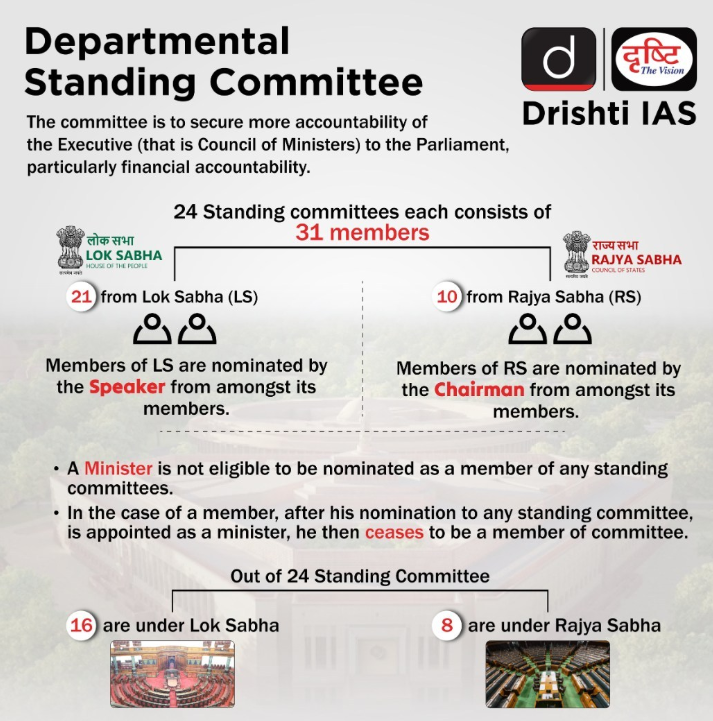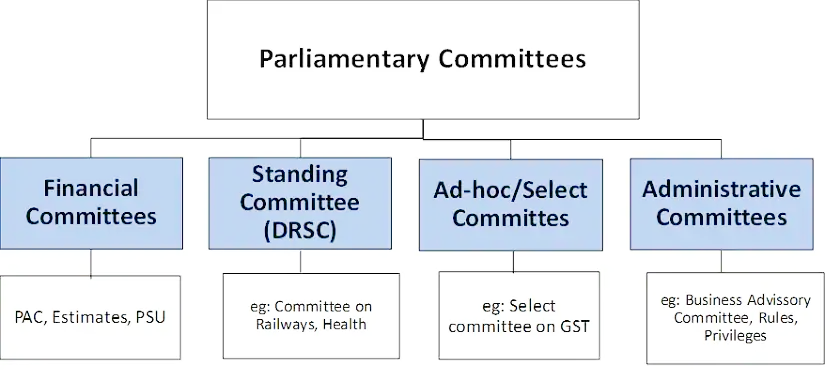Strengthening Parliamentary Committees | 26 Jun 2025
For Prelims:Parliament Committees, Article 105, Article 118, Rajya Sabha, Lok Sabha, Speaker of Lok Sabha For Mains:Parliament Committees and its Significance, Related Challenges and Measures for their Effective Functioning. |
Source: IE
Why in News?
Lok Sabha Speaker speaking at the National Conference of Estimates Committees emphasized that Parliamentary Committees are not adversaries but complementary to the government.
- He urged governments and officials to treat committee recommendations with seriousness and implement them in letter and spirit.
What are Parliamentary Committees?
About
- A Parliamentary Committee is a body constituted by the Lok Sabha or Rajya Sabha, or nominated by the Speaker/Chairman, to carry out functions delegated by Parliament. These committees:
- Work under the direction of the presiding officer.
- Present their reports to the House or the Speaker/Chairman.
- Are serviced by the Lok Sabha/Rajya Sabha Secretariat.
- Parliamentary committees, originating from the British Parliament, in India derive their authority from the Indian Constitution under Article 105 (powers and privileges) and Article 118 (regulation of business).
Types
- Standing Committees: They are permanent in nature, reconstituted every year under the Rules of Procedure or Acts of Parliament and their work is ongoing and regular. It includes:
- Financial Committees
- Departmentally Related Standing Committees (DRSCs) which examine demands for grants, bills, and policy documents of various ministries.
- Other Standing Committees such as Committee on Petitions, Committee on Subordinate Legislation, Committee on Government Assurances.
- Ad hoc Committees: They are temporary in nature and are constituted for a specific task, and dissolve upon completion of that task.
- Eg: Select Committee on GST, Joint Parliamentary Committees (JPCs) on specific Bills, Railway Convention Committee etc.
- Their purpose is to transact the detailed business of Parliament that the full House may not have time or expertise to handle in depth.
What is the Significance of the Parliamentary Committee System?
- Ensure Executive Accountability: Though committee recommendations are not binding, their detailed reports create a public record & opinion, enhance scrutiny of the executive and pressure the government to reconsider controversial decisions.
- Their closed-door nature enables candid and collaborative discussions, free from political posturing.
- Facilitate Informed & Inclusive Lawmaking: Committees serve as platforms for MPs to consult experts, civil society, and officials, ensuring evidence-based deliberation.
- Clause-by-clause scrutiny of bills, stakeholder consultations, and public participation improve legislative quality and democratic legitimacy.
- Mini-Parliaments with Bipartisan Representation: With proportional party representation and year-round functioning, committees foster non-partisan debate, inter-ministerial coordination, and in-depth examination of budgets, annual reports, and policy proposals.
- Ad hoc committees further support focused inquiry into specific issues.
- Capacity Building & Governance Reform: Committees provide authentic insights and value-added recommendations, strengthening legislation and governance.
- They act as informal training grounds for young MPs, and function beyond populist pressures and party whips, reinforcing parliamentary democracy.
What are the Key Challenges Related to Parliamentary Committees?
- Limited Powers & Weak Follow-up: Parliamentary committees are advisory bodies with non-binding recommendations.
- They lack enforcement powers and have no institutional follow-up mechanism, undermining their role in ensuring executive accountability and effective policy implementation.
- Resource & Research Constraints: Parliamentary committees face staff and infrastructure limitations, with technical support mostly confined to secretarial tasks like scheduling and note-taking.
- The National Commission to Review the Working of the Constitution (2002) highlighted a critical deficiency in specialist advisors and research support for DRSCs, hampering in-depth scrutiny and evidence-based analysis.
- Low Participation & MP Attendance: The attendance of MPs in committee meetings averages around 50%, which is significantly lower than the 84% attendance recorded during regular Parliament sessions.
- Factors such as conflicting schedules, low incentives, and lack of interest contribute to this limited participation, reducing the quality of deliberations.
- Inadequate Parliamentary Time & Scrutiny: The decline in Parliamentary sittings restricts time for effective committee oversight. In the 17th Lok Sabha’s first session, Parliament sat for only 37 days with a 10-year average (2009-19) sitting of just 67 days/year.
- As a result, key legislations and budgetary proposals often bypass detailed scrutiny, only 17% of the Union Budget was discussed in the 16th Lok Sabha.
- Political Influence & Lack of Independence: Parliamentary committees often face political interference from party leadership or external pressures, compromising their impartiality.
- Political considerations in the nomination of members further dilute the effectiveness and objectivity of committee functioning.
- Overburdened Committees & Fragmented Oversight: Department-related Standing Committees (DRSCs) handle multiple, often unrelated ministries, resulting in limited subject-specific focus and specialisation.
- Their broad mandate, along with short one-year tenures, hampers the development of expertise and limits sustained, in-depth oversight.
What Measures Should be Taken to Strengthen the Functioning of Parliamentary Committees?
- Strengthen Institutional & Research Support: Parliamentary committees need a well-equipped secretariat with access to domain experts, research staff, and reliable data.
- Providing adequate resources and modern technological tools will enable in-depth analysis, ensure evidence-based recommendations, and enhance the quality of deliberations.
- Institutionalize Accountability Mechanisms: Ministries should be mandated to submit Action Taken Reports (ATRs) within a defined timeframe.
- The government must justify acceptance or rejection of committee recommendations through written explanations, reinforcing accountability, and enhancing the authority and impact of committee reports.
- Increase Referral & Specialization: Rules of Procedure should be amended to make the referral of all non-finance bills to committees mandatory or strongly recommended.
- Additionally, the scope of each DRSC should be rationalized by reducing the number of ministries per committee to ensure focused oversight, coherence of subjects, and promote subject-specific expertise among members.
- Improve MP Participation & Capacity Building: With average MP attendance in committee meetings around 50% (vs. 84% in full sittings), targeted measures are needed—such as incentives, penalties, or formal recognition—to boost engagement.
- Additionally, regular training and orientation programmes, especially for new MPs, can enhance awareness of the importance of committee work and strengthen their legislative capacity.
- Promote Transparency & Citizen Engagement: Committee reports should be simplified in language and structure for public accessibility.
- Committees must leverage digital platforms for e-consultations, crowdsourcing evidence, and live stakeholder interactions during evidence-gathering, thereby enhancing public trust, transparency, and participation in the legislative process.
Conclusion
Parliamentary Committees play a crucial role in legislative oversight, democratic accountability, and participatory governance. Speakers call for greater respect and responsiveness to committee recommendations underscores the urgency to revitalize these institutions. As India advances toward data-driven and transparent governance, committees must evolve into the engine of reform and accountability at both Union and State levels, ensuring policies are not only well-crafted but also effectively implemented.
|
Drishti Mains Question: Q. Discuss the role of Parliamentary Committees in promoting transparency and accountability in governance. Why has their effectiveness waned recently, and what steps can be taken to restore their efficacy? |
UPSC Civil Services Examination, Previous Year Questions (PYQs)Q. With reference to the Parliament of India, which of the following Parliamentary Committees scrutinizes and reports to the House whether the powers to make regulations, rules, sub-rules, by-laws, etc., conferred by the Constitution or delegated by the Parliament are being properly exercised by the Executive within the scope of such delegation? (2018) (a) Committee on Government Assurances Ans: (b) |



